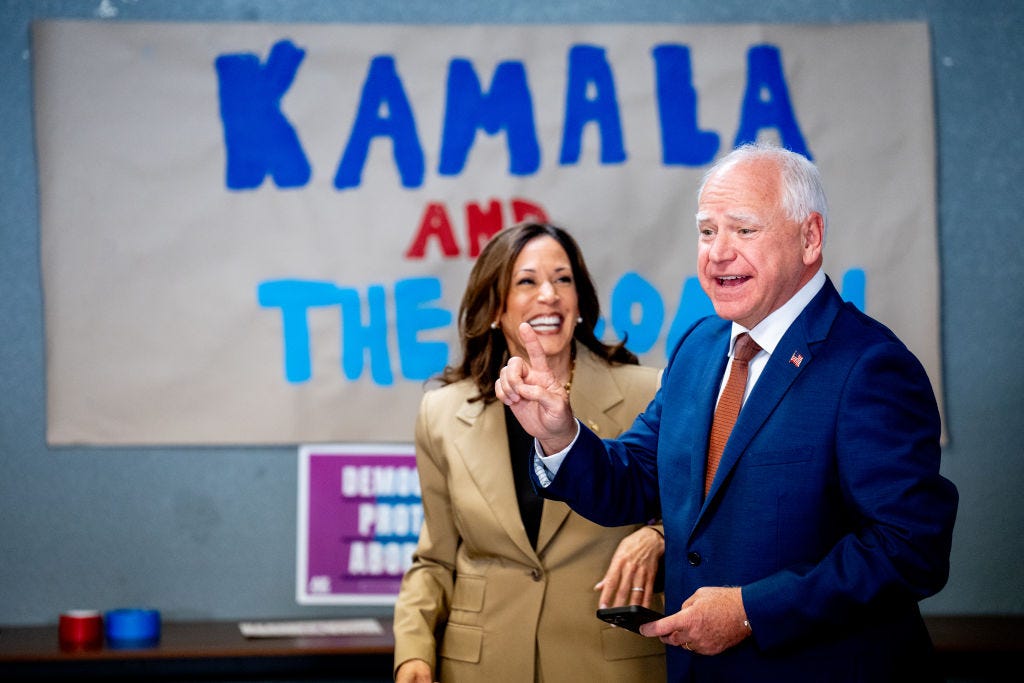Why does Tim Walz matter?
Now, we’ve talked about that a lot in this newsletter, but a lot of the significance comes down to how, for so many, he upends — productively — the received wisdom on just who rural Americans are and how they figure in the national story..
Journalist Sarah Smarsh sees in Walz and the reactions to his candidacy a confirmation of something she’s been writing about since her 2018 memoir Heartland: A Memoir of Working Hard and Being Broke in the Richest Country on Earth: rural America isn’t a monolith, class is more complex than most Americans understand, and places that seem inexorable red have not only long histories of left populism but plenty of people who are still looking for progressive solutions and ready for a national political party that recognizes and speaks to their needs as equals.
Smarsh, who grew up on a wheat farm in Kansas, has spent her journalistic career trying to advance the understanding of what class means in America, She even considered running to represent Kansas in the Senate in 2020, and while she decided that her time was better spent writing, the experience gave her insight into the mechanics of campaigning and the narratives of political messaging that have sharpened her observations of the details of America’s misunderstandings of itself.
We talked to Smarash about her new essay collection, Bone of the Bone: Essays on America by a Daughter of the Working Class, the significance of the Walz-Harris ticket and the shift in Democratic messaging and approaches to rural Americans, and her hopes for a resurgent progressive rural political platform built on recognition of actual lived experience and the need to bring joy back.
A request for those who haven’t yet joined us: The interviews and essays that we share here take research and editing and much more. We work hard, and we are eager to bring on more writers, more voices. But we need your help to keep this going. Join us today to support the kind of independent media you want to exist.
You’re known for your perspective on issues of class and the fraught relationship between rural and urban America. Based on that perspective, seeing the shift from the Biden-Harris campaign to the Harris Waltz campaign, what is your immediate reaction? Because in a way, it encapsulates so much that you have written about for years about rural America not being the conservative monolith that a lot of coastal observers imagine.
I do think that the selection of Tim Walz as the vice presidential candidate heralds a long overdue shift among Democrats to very directly validate and speak to a portion of the electorate previously left uncontested for right-wing forces to swoop in and, to my mind, successfully manipulate in some instances.
In other instances, I think that space I’m referring to is the one I come from, white rural America. For me, specifically along class lines, that’s the working poor. I also write against any stereotyping of that group in pat red and blue political frameworks.
In any red or blue state in this country, there’s a sizable, important political minority who is made invisible by the Electoral College in national contests and also often made invisible even in local and state politics, win or take all elections that we have.
Nonetheless, it has been a shift and a swing and a statistically documented truth that my space and my people, if you will, have shifted right in recent decades. I think that the going explanation for the last couple of decades, by way of my fellow Kansan Thomas Frank’s book, What’s the Matter with Kansas? asserting that folks are, quote, unquote, “voting against their best interests,” that’s never quite sat right with me in part because it implies people are stupid.
This post was originally published on The.Ink.

